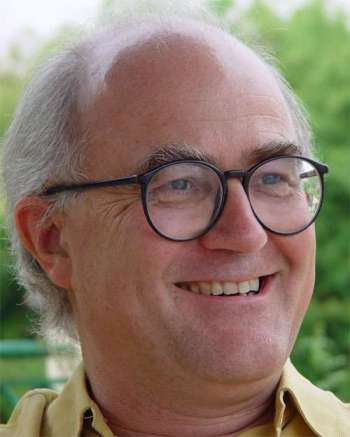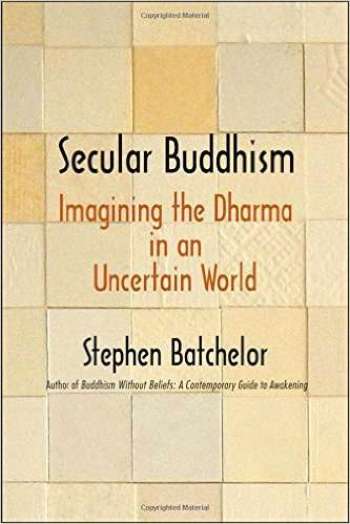As Buddhism has grown in popularity in North America, one aspect that has come to increasing prominence is its potential affinity for secularism. Books such as Stephen Batchelor’s Buddhism Without Beliefs: A Contemporary Guide to Awakening (Riverhead Books 1997), Confessions of a Buddhist Atheist (Spiegel & Grau 2011), and Secular Buddhism: Imagining the Dharma in an Uncertain World (Yale University Press 2017) have given shape to the meeting of Western curiosity and skepticism with Asian Buddhist traditions.
Defining Secular Buddhism presents a number of challenges. Each of the terms “secular” and “Buddhism” lends itself to a variety of meanings depending on context. Secular, for instance, is defined by the Concise Oxford Dictionary primarily in the negative: “adj. not religious, sacred, or spiritual.” It continues by giving the origin in Christian Latin as meaning “the world.” Batchelor himself notes his own struggle with terms such as “spiritual,” “religious,” “secular,” “agnostic,” “skeptical,” and others in the preface to Secular Buddhism.
 Stephen Batchelor
Stephen BatchelorHowever, not all types of Buddhism that have arisen in North America match well with secularism, as many have retained a markedly non-secular quality. Before disrobing, marrying Martine Fages, and settling in Devon, England, Batchelor spent 10 years as a monastic in the Tibetan and Korean Seon (Zen) traditions, which Batchelor refers to as “traditional Buddhism.”
By “traditional Buddhism” I mean any school or doctrinal system that operates within the soteriological worldview of ancient India. Whether Theravāda or Mahayana in orientation, all such forms of Buddhism regard the ultimate goal of their practice to be the attainment of nirvana, that is, the complete cessation of the craving (tanhā) that drives the relentless cycle of birth, death, and rebirth. . . . Despite their apparent differences, Theravāda, Zen, Shin, Nichiren, and Tibetan Buddhism share the same underlying soteriology, that of ancient India outlined above. (Secular Buddhism)
In opposition to this, "secular Buddhism” refers to a Buddhism that rejects the supernatural, most prominently in doctrines such as rebirth, or many interpretations of karma, or beliefs in spirits or gods. Other aspects of Buddhism rejected by secular Buddhists include strong emphasis on ritual, belief in the power of amulets or relics, and notions of extraordinarily powerful teacher-student relationships. A tension arises here, as traditional Buddhists object that without these, one cannot be a “real Buddhist.” Batchelor responds:
Each Buddhist tradition maintains that it alone possesses the “true” interpretation of the Dharma, whereas all the other schools either fall short of this truth or have succumbed to “wrong views.” Today, from a historical-critical perspective, these kinds of claims appear strident and hollow. For we recognize that every historical form of Buddhism is contingent upon the wide array of particular and unique circumstances out of which it arose. (Secular Buddhism)
Is it possible for a “real” Buddhist to reject many of the beliefs of previous Buddhisms? Secular Buddhists think so.
In a survey sent out to secular Buddhists, respondents defended their place under the umbrella of “Buddhism.” Jennifer Gentile, an atheist yoga instructor married to a Buddhist Zen priest, describes secular Buddhism as, “a guide for living ethically and morally, becoming more present without causing harm.” When asked about disadvantages, she responded, “I can’t imagine a disadvantage, other than some people might not understand what that means and be disrespectful or discriminatory.”
Similarly, Tina Hamilton, a member of the board of directors of the Association of Mindfulness Meditation and Secular Buddhism, notes: “There have been numerous studies that show that meditation actually changes the brain in many positive ways. In my personal practice, I find that I’m less reactive, and able to think things through. I was diagnosed with ADHD as an adult, and have found that with meditation, I no longer need the medication to help me focus (no medication for 10 years now). Other things that I see secular Buddhism helping with is increasing compassion and equanimity.”
Doug Smith, study director of the Secular Buddhist Association, defines secular Buddhism as: “Buddhism without speculative supernatural elements.” When asked about the benefit of this approach, he noted that, “We get the gains of Buddhist practice (wisdom, kindness, less stress) without the false or unscientific beliefs.” Gary Donnelly, a doctoral research student at Liverpool University in England, notes that secular Buddhism provides a “lack of hokum and regional superstition” and a “more realistic worldview.”
Mark W. Gura, executive director of the Association of Mindfulness Meditation and Secular Buddhism (AMMSB) and vice president of the Atheist Alliance of America, suggests that “secular Buddhism is based on critical thinking, neuroscience, and the essence of Buddhist meditation and philosophy, without its supernatural elements. Its beliefs are held only on facts, while any other information is considered opinion or hypothesis.” To this, Gura adds that the AMMSB has recently become an official affiliate of the large American Atheists organization, which was founded in 1963. This, Gura holds, marks a “historical event for secular Buddhism” as it is the first time secular Buddhists “have been embraced by another large national atheist group.”
Several respondents pointed to Batchelor’s books and videos as inspiration for their move into Buddhism, many coming from atheistic or secular backgrounds. Others actively practice with one or more traditional schools of Buddhism (Zen, Tibetan Buddhism, and Theravada were all mentioned several times), but do not hold many of the beliefs of those schools. Dr. Carol Creech, community health coordinator for the Health Education Learning Project in Dallas, Texas, has stated that, “I am a former Christian practicing Tibetan Buddhism with a near complete absence of literal belief in Tibetan sectarian practices, such as Dharma protectors. And thus ‘maybe’ a secular Buddhist.”
However, Julie Brefczynski-Lewis, assistant professor of neuroscience at West Virginia University, says, “Sometimes there is a condescending attitude towards those with beliefs—I see that in Stephen Batchelor’s writings. This attitude, I fear could steer people away from more traditional approaches, or create a safe bubble so they never would venture into concepts like karma and rebirth, which can be tremendously beneficial (even if just taken as a provisional ‘raft’ to help one cross difficult waters, but with knowledge that it will someday be left behind).”
Jennifer Hawkins, community director for the Secular Buddhist Association, who describes herself as a 32-year-old African-American, notes that her status as a minority has helped her establish greater dialogue with some traditional Buddhists. Her nuanced discussion of secular Buddhism suggested both hermeneutical and historical defenses of secular Buddhism. On the hermeneutical front, she suggests that secular Buddhists work to determine whether passages are to be interpreted literally or not: “It’s looking at these suttas and finding value—even if the original composer believed in yakshas and that one thing has turned out not to be true, does that somehow negate the whole value of a sutta? No.”
On the historical side, echoing Batchelor, she states: “Buddhism changed as it entered each new land—and so it changes a little as it enters ‘the West.’ It is simply the natural process of change and not disrespect. Personally, I have a great deal of gratitude to Gotama Buddha for sharing what he found and to all of those who transmitted his ideas (and some of their own) through time so that it could reach me. Really looking closely at the suttas and at the history of Buddhism’s changes does not diminish that respect or gratitude—if anything, it adds to it.”
Full disclosure: the author serves on the board of directors for the Association of Mindfulness Meditation and Secular Buddhism and has been interviewed twice for the Secular Buddhist Association podcast.
References
Batchelor, Stephen. 2017. Secular Buddhism: Imagining the Dharma in an Uncertain World. New Haven: Yale University Press.
See more
Association of Mindfulness Meditation and Secular Buddhism
Secular Buddhist Association
Stephen Batchelor: Biography (Martine & Stephen Batchelor)
Related features from Buddhistdoor Global
Stepping Up to the Plate: An Invitation to Open Your Heart to Nature and Walk the Talk
“Mindfulness is a Moral Arc:” An Interview with Dr. Lynette Monteiro
Sumeru Books, Canada’s Buddhist Hub
Spiritual fulfilment requires doctrinal commitment and ecclesiastical continuity
















